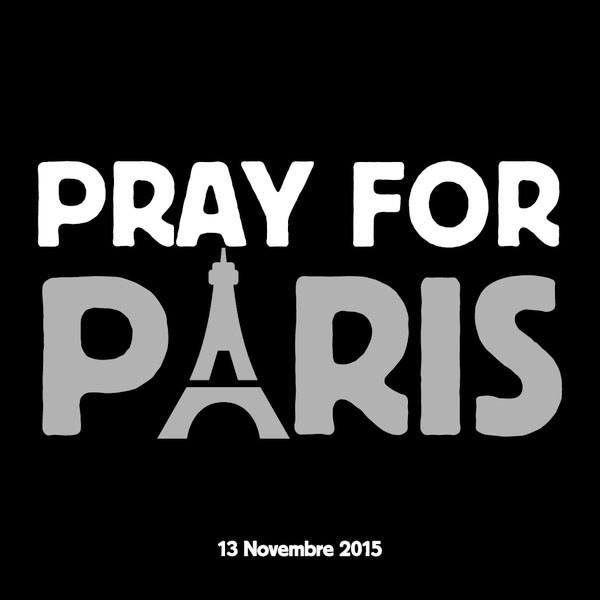The Paris mass shootings and bombings have been terrible. It’s a right minefield of religion, politics and sadness. One idea which has routinely popped up on social media has been that Christians should pray for Paris.
Let’s just think about this for a second.
- God could easily have stopped this event from happening, but didn’t.
- If God is all-loving and all-powerful, and cannot allow gratuitous evil, then this suffering was necessary for a greater good.
- Thus wishing it not to have happened would be a) against God’s will and b) denying a greater good to come about.
That’s the first part of the issue concerning prayer.
The second is something which should be pretty obvious. God supposedly has full divine foreknowledge, right? He knows the future. In this way, God is actually constrained. I wrote a piece called “God cannot act contrary to his own predictions” in which I stated:
It has long been understood that with God’s omniscience, he cannot be contrary to his own predictions. For example, if you were claimed as being omniscient and omnipotent and you predicted beforehand that you would make yourself spaghetti bolognaise for supper on Friday, then when it came to making Friday’s supper, you would have no choice but to make the spaghetti bolognaise. This is because if you decided to be contrary to your own prediction and cook, say, pizza, then your prediction would have been incorrect. This would render your omniscience faulty, and would leave you with the characteristic of fallibility.
Likewise, God does not have omnipotence, because he cannot do something that would invalidate his infallible predictions.
So, logically, God can never be contrary to his own predictions. This constrains his free will quite significantly. However, it is far more serious than this. If he is creating the universe and knowing every particular outcome (even if one argues that he is somehow still allowing free will), then he has made predictions about every event that will come to pass. His foreknowledge is effectively one long prediction.
Thus, from the beginning of time onwards, everything must come to pass exactly as God had predicted at the actualisation of the cosmos. This has far-reaching consequences: God does not have free will, intercessory prayer is pointless, God cannot change his mind, God’s own future and interferences on earth are determined, and the passage in the bible where God changed his mind over the fate of Nineveh is patently false.
(Jonah 3: 10 “When God saw their deeds, that they turned from their wicked way, then God relented concerning the calamity which He had declared He would bring upon them. And He did not do it.”)
God cannot change his mind on matters of the course of history (or present, more correctly). It’s not like he’s sitting there, and then hears a prayer and says “Hey, great idea, I never thought about that!” and then changes his mind. This makes no sense. God will always do what is maximally loving, and no prayer will change that, or can change that, unless itself was part of the matrix of variables.
This renders prayer utterly pointless. There is no need to pray at all, since you cannot effect a change in the mind of God. In changing God’s mind, you would be rendering his foreknowledge and omniscience false. You would be invalidating God!
So what, exactly, would praying for Paris achieve? As with anything in the real world, direct action, giving money, or some such other tangible thing is far more powerful than prayer and something I would obviously far rather advocate. Think of Haiti, for example. Would all those people who had lost their homes and their livelihood have liked a prayer or some money, or your time, to have helped them? Given that prayer cannot bring about a change in what would already take place, then the other options are far more tangibly attractive. If one would consider all the man hours applied to prayer and think about turning those towards doing something more tangible, then I would claim the world might actually be a better place.
It turns out that, in reality, prayer is more about the person praying, more about making them feel better, than the people being prayed for. As someone sits powerless, hundreds or thousands of miles away, unable to do anything when reading about such horrors on the internet or in newspapers, then their impotence in the face of such horror is palpable. Prayer gives the illusion that they are able to do something to help, that they are not powerless.
But it is an illusion. Nothing more.
Prayer is a comfort to the person praying. In this case, it is no real comfort to those suffering in Paris.
There is a lot to solve in trying to make right our difficult and fractured world. Prayer simply ain’t the answer.
RELATED POSTS
- I talked about similar prayer problems previously in a piece called “Rebecca Ferguson, intrecessory prayer, and 240,000 tsunami deaths…“.
- Oh, my! Randal Rauser on prayer (God or Godless)
- Bicycle pumps and why prayer seems to work… sometimes…

